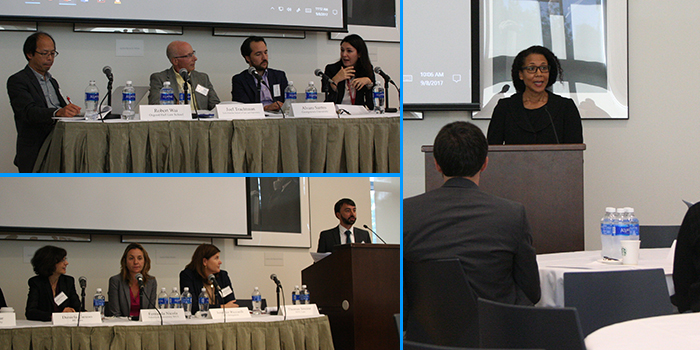Trade Law in the Trump Era
BU Law draws scholars from around the world to examine the impact of critiques of trade in the US and abroad.
 Trade Law in the Trump Era: A Transatlantic Perspective, a two-day conference hosted by Boston University School of Law and co-funded by the Erasmus+ Program of the European Union, drew scholars from around the world to examine the impact of rising critiques of trade and globalism both in the US and abroad.
Trade Law in the Trump Era: A Transatlantic Perspective, a two-day conference hosted by Boston University School of Law and co-funded by the Erasmus+ Program of the European Union, drew scholars from around the world to examine the impact of rising critiques of trade and globalism both in the US and abroad.
“These questions aren’t new,” said Dean Maureen A. O’Rourke in her welcome to conference guests, “but the sentiments of anti-globalism are new to this time.” As she reflected on the “intensely local impact” trade can have, she recounted a relative’s experiences when the textile market, his town’s main industry, began to move out of the US. “While questions are debated on a high level,” she said, “they have very personal consequences, and I think it’s good to remember that.”
BU Law Professor and European Union Jean Monnet Chair Daniela Caruso organized the event with Chantal Thomas, BU Law’s William & Patricia Kleh Visiting Professor in International Law and professor of law at Cornell University. BU Law Professors Rebecca Ingber and Rob Sloane joined in the effort as moderators and discussants.
Thomas framed the conference as an opportunity to take stock of the current crossroads in international trade and economic law. While the existing frameworks of international economic law are being challenged in ways that “threaten economic prosperity, but also global peace and stability,” Thomas also noted that the “global north, particularly the middle classes, have experienced wage stagnation in conjunction with these trade agreements.” She urged the audience to consider these problems from many sides.
Regionalism and the effects of NAFTA
The conference kicked off with a panel on regional and bilateral agreements. Arguing for the need to distinguish jobs from economic welfare, Joel Trachtman, professor of international law at the Fletcher School at Tufts University, suggested the Trump administration’s focus on bilateral trade deficits overlooks the gains of trade deals like NAFTA, especially for consumers.
Alvaro Santos, of Georgetown Law, considered NAFTA’s effects on Mexico: “There is a perception that NAFTA helps other countries, but not one’s own,” he said, recalling that the agreement had “promised to be a trigger for development” that Mexico hasn’t seen.
“This should be a call to rethink what the form of globalization should be,” he said. In the face of such uncertainty, Robert Wai of Osgoode Hall Law School of York University noted that the mix of legal instruments in place in these trade agreements have created a plural order in which the decline of one treaty will not necessarily destabilize the system. This system, Wai observed, continues to be composed of a myriad transnational and domestic regimes.
The conversation then turned to multilateralism, the Doha round of World Trade Organization negotiations, and the challenges to these agreements as the US and UK increasingly turn toward trade regionalism. “The conventional wisdom that regional trade agreements will overtake multilateralism is greatly overstated,” said Robert Howse of NYU Law, while Joost Pauwelyn (Geneva Graduate Institute and Georgetown Law) expressed cautious optimism about the long-term prospects of multilateralism. Elizabeth Trujillo of Texas A&M University Law highlighted the benefits of regionalism from the perspective of regulatory cooperation, while Kerry Rittich of the University of Toronto expressed serious concerns about the possibility of addressing workers’ rights in any meaningful way within the current trade agreements, multilateral and regional alike.
Distributive justice in trade
On questions of distributive justice, Chantal Thomas addressed the debate over whether trade or technology is most responsible for an “unprecedented level of economic inequality, at least since post-World War II,” a topic she took up again and set in a broader global context later in September when she delivered BU Law’s annual Kleh Lecture.
Frank Garcia, of Boston College Law, discussed the implicit social contract in trade: workers will support a free trade policy that could put some jobs at risk but will also benefit the majority, and in turn, the government will take care of the workers who are in losing positions. “We’ve never consistently followed through on that,” he said, “…the politics of today are suggesting we have to reimagine trade law.” Marija Bartl, associate professor and deputy director of the University of Amsterdam’s Centre for the Study of European Contract Law, considered that question and argued that current conceptual frameworks stand in the way of reforming European trade law and policy to facilitate socio-economic change.
Considering paths to reverse these trends, Dan Danielsen of Northeastern Law suggested more distributional equity might improve trust in the system. However, he cautioned that some approaches to reform, such as shifting policy back to states, may backfire. “For most states, the government isn’t acting in the interest of the polity, but in the interest of the few at the expense of the many,” he said.
Balancing trade interests and political concerns
The next panel focused on state-led strategies for growth, most notably pursued in China, Brazil, and India. Sonia Rolland of Northeastern Law highlighted the plurality of developmental strategies in the Global South, while Mark Wu of Harvard Law School discussed the perspective of the Chinese government on the current state of global trade law. “It could be just a white man’s crisis,” he said. Chris Brummer of Georgetown Law and Kevin Gallagher of Boston University offered conceptual and technical insights on the impact of trade agreements on vital issues of monetary and financial stability.
Jen Riccardi of the EU Delegation suggested there is a disconnect in the way the European Union and the United States deal with the adverse effects of trade. The EU’s flexible workforce and retraining programs have created a social safety net that allows people who have been displaced to regain their footing. That model of worker retraining and apprenticeship, she noted, is now being put in place in many US states. Professor Fernanda Nicola of American University Washington College of Law, focusing on the EU Court of Justice, highlighted the role of courts in balancing trade interests and political concerns in the EU’s neighborhood—, especially Africa. Daniela Caruso discussed the impossibility of redressing the negative externalities of trade agreements upon non-party states within the framework of existing WTO law. Dr. Luwam Dirar (Cornell Law, Harvard) contextualized and problematized the EU’s trade and development policies, and Dr. Streinz (NYU Law) called for explicit proposals addressing the asymmetries of current trade regimes.
This call to understand the full reach of trade policy and to reimagine global trade laws animated the Saturday morning roundtable. Dave Trubek, professor emeritus at Wisconsin Law, outlined specific reform projects led by trade lawyers and economists, and the group adjourned with a renewed sense of purpose.
Related News
- Professor Daniela Caruso Named Jean Monnet Chair
- Colleagues Pay Tribute to Professor Larry Yackle with Symposium on Federal Courts
- Annual Pro Bono and Public Service Event Honors Ronald E. Richter (’89)
